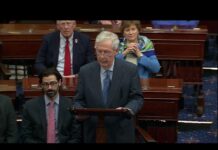In a 5-4 opinion yesterday, the U.S. Supreme Court allowed the Biden administration to enforce a rule that requires health care workers at facilities that participate in the Medicare and Medicaid programs to be fully vaccinated against COVID-19 despite the absence of clear statutory authorization. The Court noted the mandate applies “unless exempt for medical and religious reasons.”
The mandate for health care workers was issued in November 2021 by the Centers for Medicare and Medicaid Services (CMS) within the Department of Health and Human Services (HHS) and requires facilities that receive Medicare or Medicaid funding to require workers to get the COVID injection with no testing opt-out unless they qualify for a medical or religious exemption.
In the 5-4 decision in Biden v. Missouri, the Court allowed the Medicare and Medicaid mandates to go into effect pending the ongoing litigation and any future petition for cert that may be filed. However, health care workers are still entitled to religious accommodations in the workplace.
Justice Clarence Thomas filed a dissenting opinion that was joined by Justices Alito, Gorsuch and Barrett. Justice Thomas acknowledged a concern that the Biden administration proposes to find virtually unlimited vaccination power over millions of health care workers even though the government did not establish that the Medicare Act, or any other law, gives it the authority to impose this shot mandate in facilities that participate in Medicare or Medicaid.
“The Government has not made a strong showing that this hodgepodge of provisions authorizes a nationwide vaccine mandate,” Justice Thomas wrote.
Further, in his dissent, Justice Thomas wrote, “If Congress had wanted to grant CMS authority to impose a nationwide vaccine mandate, and consequently alter the state-federal balance, it would have said so clearly. It did not. These cases are not about the efficacy or importance of COVID–19 vaccines. They are only about whether CMS has the statutory authority to force healthcare workers, by coercing their employers, to undergo a medical procedure they do not want and cannot undo. Because the Government has not made a strong showing that Congress gave CMS that broad authority, I would deny the stays pending appeal. I respectfully dissent.”
Justice Alito warned in his dissent that rewarding such departures from administrative procedure “may have a lasting effect on Executive Branch behavior.”
“Today’s decision will ripple through administrative agencies’ future decision making. The Executive Branch already touches nearly every aspect of Americans’ lives. In concluding that CMS had good cause to avoid notice-and-comment rulemaking, the Court shifts the presumption against compliance with procedural strictures from the unelected agency to the people they regulate. Neither CMS nor the Court articulates a limiting principle for why, after an unexplained and unjustified delay, an agency can regulate first and listen later, and then put more than 10 million healthcare workers to the choice of their jobs or an irreversible medical treatment,” Justice Alito wrote.
Despite this decision from the Supreme Court, health care workers are still entitled to medical and religious exemptions under federal and some state laws.
Liberty Counsel Founder and Chairman Mat Staver said, “Congress needs to restrain the Executive Branch and the administrative agencies. Upholding this mandate for health care workers sets a dangerous precedent and expansion of federal authority. Neither the mandate nor the Supreme Court’s decision alters the fact that health care workers may be exempted for medical or religious reasons.”

















